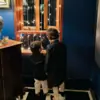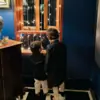Interestingly, the same desi millennials who worship Princess Diana and abhor the royal family for doing her dirty hate Megan just as much as they loved Diana.
Is it racism?
Partially, yes. One can't deny that desis tend to favor white people while looking down on dark people. But that is a piece of the puzzle.
The bigger piece of the puzzle is something most desis and the royals have in common - culture and tradition, hierarchical family dynamics, and the notion of saving face. Even the most modern and rebellious desi youth often acquiesce to certain traditions. There is this unwritten expectation that family elders will be intentionally cruel and demanding to newcomers until the newcomer somehow proves they are part of the family. Sometimes even if the family doesn't subscribe to a tradition, "log kya kahenge" or "saving face in society" tends to dictate certain behaviors. And people understand that its not personal but a weird ritual.
We see it in K3G. Yash Raichand is a staunch patriarch. But he has soft corners, like adopting Rahul and raising him equal to his biological son. Other than those who knew, no one could even tell that Rahul was adopted. He's willing to give his business, inheritance, and entire patriarchal lineage to someone who is not his flesh and blood (something alien to traditional South Asian patriarchs.) But Rahul crosses a line when he marries Anjali.
As viewers, we are furious at Yash Raichand, but we somehow get his decision. We know it is not personal against Anjali but a weird deference to the class hierarchy. Even if we hate and want to dismantle the class hierarchy, we deeply understand why some elders bow to it. We know and expect to navigate around it. We are sad when Rahul leaves his life and family behind for Anjali, but we support it. Rahul doesn't leave because he's angry at Yash for disrespecting Anjali - he leaves because he knows he's broken a sociocultural barrier and doesn't know when it can be mended again.
Megan rubs people the wrong way because she came into the royal family with her rugged American individualism. From day one, the only thing that mattered was her dignity and self-respect, not the traditions, expectations, and pressures of the royal family. Not that a person's dignity and self-respect don't matter - it is of utmost importance - but it's a delicate balance when your family represents the face of a nation.
The British press had been harsh to Diana, Fergie, and Kate. Diana and Kate eventually won over the press with their poise and grace. In Megan's defense, Diana and Kate never had to fight racist statements and presumptions. It is one thing to face class snobbery and another to endure racism.
So Harry and Megan were right to walk away. The royal family expects the daughter-in-law to sink or swim - either win over the people or perish. Diana and Kate won people over. Fergie learned to live and revel in the negative tabloid attention. Since her criticism was entwined with racism, it made sense to step away rather than try to overcome it.
But unlike Rahul and Anjali, who walked away silently, Harry and Megan drew attention to their exit. Rahul and Anjali could have easily called out Yash Raichand and his patriarchy and elitism. Rahul could have called out Yash for harboring caste and class biases and mistreating/looking down on Anjali and her family. Nor does Anjali expect him to. She doesn't take the family's judgment of her class specifically as a judgment of her. Even though she has been intimidated and insulted by Yash Raichand, she's heartbroken that she's the cause of a rift in the family. All Rahul and Anjali yearn for are to repair the broken relationships, no strings attached. On the other hand, Megan took everything personally, called out everyone, and expected Harry to do the same. It doesn't seem Megan and Harry want to mend their relationships. They want unconditional apologies or acknowledgment of wrongdoing.
Objectively, Megan and Harry did nothing wrong. They were in a bad situation; they left it and called it out. Subjectively, from specific sociocultural lenses, Megan and Harry broke every expectation of tradition and family. Those who were raised with the sociocultural lens of making sacrifices for family see Megan and Harry as the villain. Those who were raised with the sociocultural lens that individual rights trump the collective see Megan and Harry as the villains. And those that have been exposed to both sides can see both sides.































